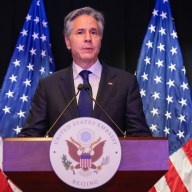CARACAS, Venezuela – Rafael Antonio Caldera, who helped establish
democracy in Venezuela, went on to serve two terms as president and
issued the pardon that allowed Hugo Chavez to rise to power, died
Thursday at age 93.
Caldera died around 2 a.m. in the capital of
Caracas, his son Andres Caldera said on television. He did not give a
cause of death, but the former president suffered from Parkinson’s
disease for several years.
Although 20 years divided his terms,
Caldera’s manner of ruling was the same: Reserved, tough with political
adversaries and inclined toward populism. He was also known for living
simply and eschewing luxuries, and for integrity in a country where
corruption is common.
And though he pardoned Chavez in 1994, he was later at deeply at odds with Venezuela’s current president.
Andres Caldera said the former president’s relatives do not want the current government to play any role in commemorating him.
“The
family has already discussed the matter, and we decided we will not
accept any homage from the government of Hugo Chavez,” he said.
Born
in 1916 in the northwestern state of Yaracuy, Caldera obtained a
political science degree at the Central University of Venezuela,
entered politics in the 1930s and founded the Social-Christian COPEI
party, a movement grounded in the middle class, in 1946.
Fully democratic presidential elections were held the following year, won by the novelist Romulo Gallegos.
But
democracy collapsed and Caldera helped revive it as one of the three
signers of the Punto Fijo pact, which organized elections after the
fall of dictator Gen. Marcos Perez Jimenez in 1958.
Under the pact, COPEI and Romulo Betancourt’s Democratic Action party shared power for nearly 40 years.
“One
of the heroes of our civil democracy has disappeared,” former
presidential candidate and COPEI leader Eduardo Fernandez said
Thursday, calling Caldera a great statesman committed to dialogue.
As
president from 1969 to 1974, Caldera eliminated the remnants of leftist
guerrilla movements by granting them a general amnesty. The period was
also marked by lavish government spending of oil revenues on public
works and a growing bureaucracy.
Two decades later, with
Venezuela in turmoil following two failed military coup attempts in
1992 and the impeachment of President Carlos Andres Perez on corruption
charges, Caldera won a new term in 1993 without the backing of COPEI,
breaking the Punto Fijo power-sharing pact he had helped craft.
In
office, Caldera soon confronted the nation’s worst banking crisis, in
which half of Venezuelan banks failed. He decreed price and currency
exchange controls to surmount the crisis and focused on development in
interior Venezuela.
Caldera led the country through relative
stability, and also granted amnesty to a young army paratroop commander
behind one of the coup attempts: Hugo Chavez, who four years later
would be elected to succeed Caldera.
Chavez and the author of his release from jail had a testy relationship over the years, however.
In
a 2003 newspaper interview, Caldera warned that violence could ensue if
Chavez, using state resources, blocked efforts to hold a recall
referendum on his leftist presidency. Caldera questioned the legitimacy
of a new constitution under which Chavez has increased his power.
Chavez
shot back that the comments “reflect the depths of desperation” that
opponents to his rule had reached. He blamed Caldera and others for
creating a corrupt system that left millions of Venezuelans to live in
poverty.
Caldera is survived by his wife, Alicia Pietri, and six children.
A funeral is scheduled for Dec. 26 in the capital.
















